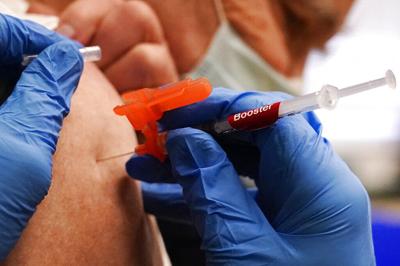COVID-19 is on the rise again in Louisiana, with confirmed cases and hospitalizations more than doubling statewide between the end of May and early August.
"It's fair to say we're entering another surge of COVID-19," State Health Officer Dr. Joe Kanter said.
This will be the eighth time since early 2020 that Louisiana has experienced a surge in COVID-19 cases, Kanter said. But unlike in the early days of the pandemic, when the virus was entirely new and thousands of patients were being hospitalized every day, hospitals will likely not be faced with overwhelming patient numbers.
The last two surges brought with them high numbers of transmission but lacked in clinical acuity, Kanter said, meaning fewer people were getting so sick that they needed to be hospitalized.
“That’s without question the hope and expectation for this current surge," he said.
By the numbers
The state's last surge ended in the middle of March, Kanter said, and in the lull that followed, the state's case numbers hovered in the high 100s and 200s new each day.
Between May 30 and June 5, Louisiana saw a moving average of about 170.6 cases a day. Between June 10 and 16, the state's moving average was even lower, at 113.9 cases.
During the same time, hospitalizations ranged between as few as 57 daily patients throughout the state and as many as 94.
Cases started trending upward at the end of June and continued to rise through all of July, eventually hitting a peak average of 448.3 cases between July 20 and 26.
Hospitalizations spiked through July too, rising from 52 hospitalized patients statewide on June 22 to 183 on August 5.
Kanter said the case count is likely even higher now that at-home COVID tests, the results of which aren't reported to the health department, are easily accessible. Still, he said hospitalizations and deaths are nowhere near the massive surges of the past.
COVID cases tend to rise and fall as new variants emerge, and Kanter said a new variant of the omicron family, EG.5, appears to be the culprit behind this latest surge.
While EG.5 appears to be more transmissible than past variants, it doesn't seem to be associated with more severe illness.
Staying safe
There's no cause for alarm or any reason to expect that the latest surge will create another emergency situation, according to the Louisiana Department of Health. The lull between mid-March and now was the longest between surges so far since COVID emerged.
“So we were overdue," Kanter said. "No one is really surprised by this.”
A vast majority of the state's population has either had COVID-19 at least once or been vaccinated against it, so most people should have at least some protection the new variant. Washing hands, home testing and staying home while sick are all still good ways to slow the spread.
For those who might be at a higher risk of severe infection, Kanter recommends discussing potential prevention tips with a trusted health care provider.
A new booster shot should also be available in one to two months, Kanter said, which protects against an omicron variant and will be available at around the same time flu shots are recommended.



